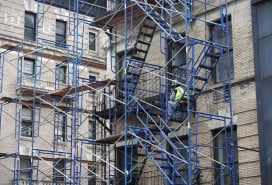How to be financially smarter during your NYC renovation

iStock
Money, like many things, is tricky business. And given the alacrity with which money moves and regulations change, it’s always wise to keep up with best practices when it comes to your dollars and cents.
It goes without saying that when you’re making a major investment, you’re going to want to be as financially savvy as possible–to avoid overpaying for work, being incorrectly taxed, and so on. It’s one thing, perhaps, to overpay a little bit on that really nice cup of designer coffee. But when we’re talking about hundreds of thousands of dollars on a project like a major home renovation, you’re going to want to get smarter about your spending. Mistakes, unfortunately, can be costly.
Be your own tax advocate
There’s that old saying, attributed to Ben Franklin, that goes, “In this world nothing can be said to be certain, except death and taxes.” A little grim, but also a little wrong! In the world of home renovation, the homeowner is not responsible for paying a sales tax on every line item.
Let’s take a step back for a moment. In order to understand what is taxable and what isn’t, let’s talk about capital improvements.
A capital improvement is an addition or alteration to your home that adds value to (or extends the useful life of) your home, becomes a permanent part of your home, and is intended to remain a permanent addition to your home. So if you’re installing built-in cabinetry in a kitchen reconstruction, that’s a capital improvement. If you’re replacing the HVAC system, that’s also a capital improvement. But if you’re buying an expensive washing machine, sorry, you must pay sales tax! Any item that can be removed from the home without causing material damage to the home or the item itself does not fall into the category of capital improvements.
Spend less, build faster with Bolster. "We deliver risk-free, on-time, on-budget renovations," says Bolster's CEO and co-founder Anna Karp. "We give you a fixed-priced cost up front, and absorb all unforeseen project costs after the demolition phase. Bolster--not you--is responsible for any and all surprises." Ready to start your renovation? Learn more >>
When you’re looking at financial documentation from your general contractor, like an estimate or an invoice, there are two places where you should not see sales tax applied:
Capital investment labor and materials
No New York sales tax is imposed on the home owner for capital improvement projects, including charges for labor related to the installation of the capital improvement.
The certificate of capital improvement (Form ST-124, available here) documents the permanent and value-adding work completed in your home during renovations. You should fill out Form ST-124 and detail the capital improvement work as precisely as possible on the form, and return it to your general contractor no later than ninety days after completion of the capital improvement project for tax purposes.
After the general contractor accepts and signs Form ST-124, he or she should not collect sales tax on the capital improvement project and is no longer liable for any sales tax due on the project. You are then responsible for any sales tax due on the total cost of the project if it is later determined that the project does not qualify as a capital improvement.
See the official New York State Department of Taxation and Finance publication which provides a comprehensive list of jobs which do and do not qualify as capital improvements.
To get a little more in the weeds, let’s talk about the capital gains exclusion after the completion of work. Here’s a handy breakdown of the tax implications if and when you sell your renovated home–after it has appreciated in value and you’ve lived in the space for at least two of the five years prior to the sale.
Without making it overly complicated, capital improvements lessen the taxable amount of your home's capital gain (or value appreciation) during the sale. Investopedia provides a handy example with real numbers, to help illustrate what we mean here.
"Assume, for example, a person purchases a home for $650,000 and then spends $50,000 to renovate the kitchen and add a bathroom. The cost basis of the home, therefore, increases from $650,000 to $700,000. After 10 years of owning and living in the home, the homeowner, who is single and files his taxes as such, ends up selling the property for a price of $975,000. If no capital improvements had been made, the taxable amount for the capital gain would have been $75,000, derived as $975,000 (sale price) - $650,000 (purchase price) - $250,000 (capital gains exclusion). However, because the capital improvement increased the cost basis by $50,000, the taxable amount for the capital gain would be $25,000, calculated as $975,000 - ($650,000 + $50,000) - $250,000."
Before you go shopping, consult with your general contractor
Once the renovation is underway, there’s all sorts of materials and appliances that will eventually find their way into your home. A new fridge! Beautiful windows! Three types of tile!
Finding and purchasing the things that will literally create your new home is fun and exciting–but we’d advise you chat with your contractor before putting down your credit card. Why? Most savvy contractors have preferred relationships with vendors and can purchase items in bulk, resulting in lower costs.
When you’re investing so much into something as important as your home, it’s critical to know exactly where your money is going. (You’re not going to want to see a line item on an estimate that simply says “labor,” for instance.) To that end, your contractor’s estimate should be as detailed as possible.
Every year, New Yorkers waste over $700M following the usual renovation process.
Bolster has uncovered the drivers behind these inefficiencies and has developed a proprietary solution that applies to every home renovation project. Bolster is the first company to bring radical transparency, analytics, and accountability to the entire process. They promise that every project is thoughtfully designed and beautifully delivered for a fair price, on time, and on budget. To start your major home renovation project, visit bolster.us
























